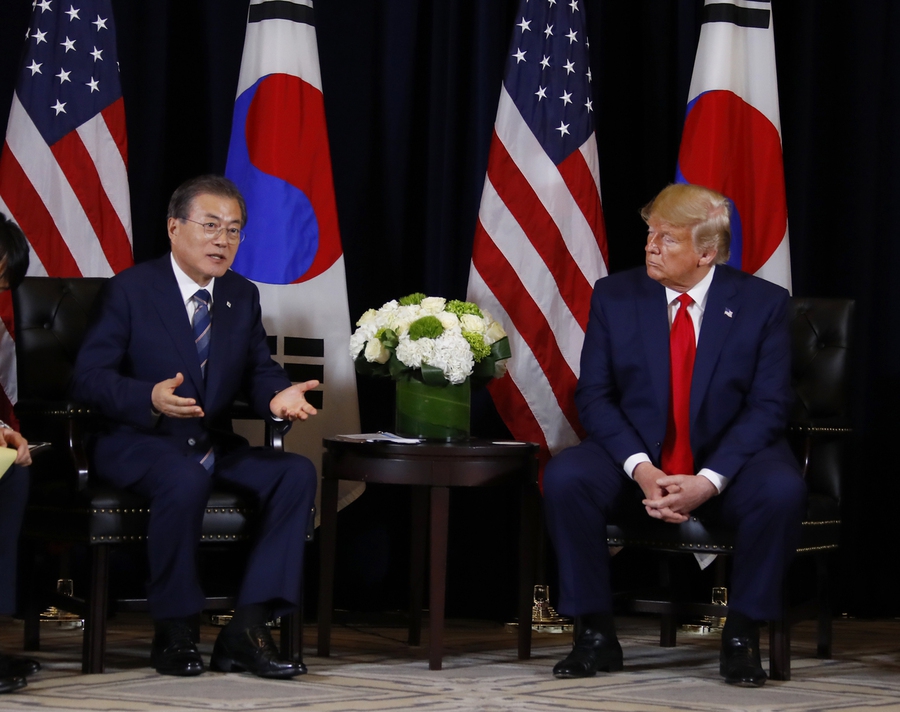 |
|
South Korean President Moon Jae-in and US President Donald Trump at the InterContinental New York Barclay on Sept. 23. (Blue House photo pool)
|
Optimistic mood nurtures hopes of Kim Jong-un attending S. Korea-ASEAN summit in Busan
The Blue House said that the greatest achievement of South Korean President Moon Jae-in’s attendance at the UN General Assembly and his summit with US President Donald Trump during a five-day visit to the US was the “reactivation of the Korean Peninsula Peace Process,” including an agreement for both countries to end hostilities with North Korea and bring about a “qualitative shift” in their relations. Given the current trend in North Korea-US relations, Blue House officials are also predicting hopefully that North Korean leader Kim Jong-un might attend a special summit between the leaders of South Korea and the Association of Southeast Asian Nations (ASEAN) that will be held in Busan in November. On Sept. 25, the day that Moon wrapped up his New York itinerary, Blue House officials played up the significance of Moon and Trump expressing their shared determination during the summit to work proactively to bring about a “qualitative shift” in relations with North Korea. This corresponds to the Blue House’s official announcement the previous day that Moon and Trump had “reconfirmed their commitment to transform their relations with North Korea in order to end the hostile relations that have lasted for nearly 70 years and to build a lasting peace regime on the Korean Peninsula.” Before releasing an official announcement about a summit meeting with the US, the Blue House coordinates the announcement’s language with the Americans. The notable thing about this announcement is the appearance of a new expression: relations with North Korea are to be “shifted beyond simple improvement.” While improvement refers to quantitative change, a shift refers to qualitative change, heralding a transition from nearly 70 years of “hostile relations” to the creation of a “lasting peace regime on the Korean Peninsula.” The Blue House also stressed the fact that Trump, during his remarks prior to his summit with Moon, said, “We’re not considering actions at all. There’s no reason for actions.” Considering that Trump added shortly thereafter that the US “would have been at war right now with North Korea if I weren’t president,” the Blue House interprets that as a reference to military action. In short, the Blue House believes, Trump was sending Kim Jong-un a clear signal that he is ruling out military action and will deal with this issue through dialogue and negotiations. Observers were also keeping a close eye on the first meeting between White House National Security Advisor Robert O’Brien (who has replaced John Bolton, an ultra-hardliner on North Korea) and Blue House National Security Office Director Chung Eui-yong, which was held on Sept. 24, shortly after Moon and Trump’s summit. Chung and O’Brien’s meeting was reportedly very cordial. Blue House’s proposal for creation of international peace zone in DMZ The Blue House also reported that the proposal for the creation of an international peace zone in the demilitarized zone (DMZ) that Moon made during his speech at the UN General Assembly was rather positively received. Moon’s proposal is to remove the 380,000 antipersonnel landmines in the DMZ with the help of the international community and to bring in UN agencies and ecological and peace groups to turn the DMZ into a “corridor of peace” that can promote the peace and safety of the divided Korean Peninsula. This proposal was reportedly welcomed by UN Secretary-General António Guterres. The Blue House furthermore believes that implementing this proposal would dramatically reduce military tension between South and North Korea, in tandem with a military agreement reached during the inter-Korean summit in Pyongyang on Sept. 19, 2019. That could effectively provide the North with a security guarantee, one of the rewards it seeks for denuclearization. The Blue House is optimistic that the North Korea-US working-level negotiations will be held within a month, and possibly as soon as in two weeks. If the working-level talks go well and a third North Korea-US summit becomes likely, the Blue House thinks that Kim could attend a special summit between South Korea and ASEAN in Busan this November. During an appearance before the National Assembly’s Intelligence Committee on Sept. 24, National Intelligence Service (NIS) Director Suh Hoon said that Kim could visit South Korea in November depending on how much progress is made in the North Korea-US denuclearization talks. While Suh qualified that prediction with several caveats, the Blue House presumes that Suh wouldn’t have made that response without sufficient grounds. Last month, Moon said he “believes that Kim’s attendance at a meeting with the 10 countries of ASEAN would be a significant opportunity for peace on the Korean Peninsula and in East Asia.” As the grounds for such relative optimism, the Blue House cited the firm level of mutual trust between Kim, Moon, and Trump. The Blue House has concluded that another significant result of this summit is its reconfirmation of the strength of the South Korea-US alliance. “The two presidents reconfirmed that there’s not the slightest disturbance in the South Korea-US alliance, which is a linchpin in the peace and security of the Korean Peninsula and of Northeast Asia,” Blue House Spokesperson Ko Min-jung said the day before. Ko’s remarks were effectively a rebuttal of concerns by South Korean conservatives that the alliance had been weakened by Seoul’s decision to terminate its GSOMIA intelligence-sharing agreement with Japan. By Seong Yeon-cheol, staff reporter, and Lee Je-hun, senior staff writer Please direct comments or questions to [english@hani.co.kr]






